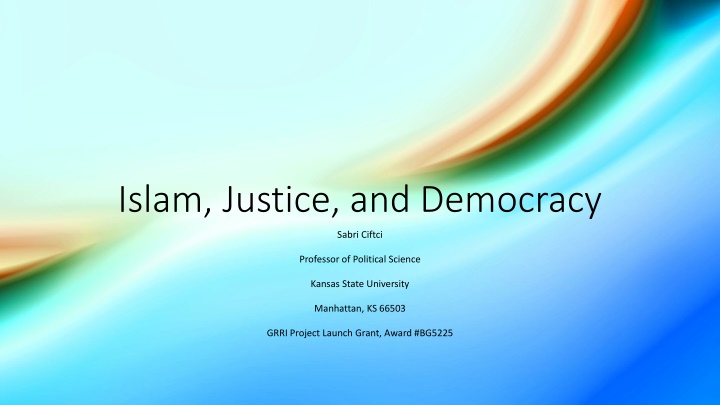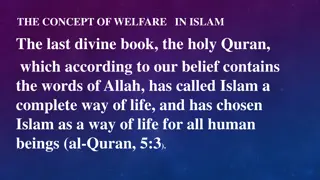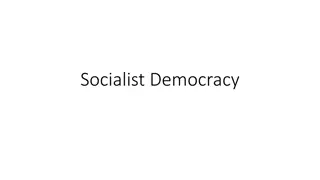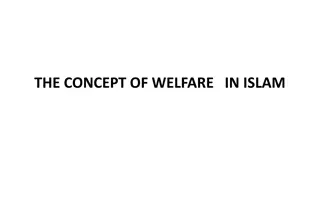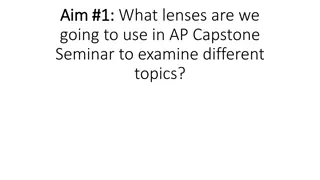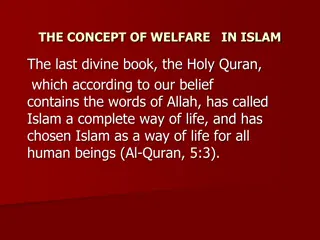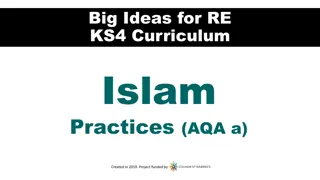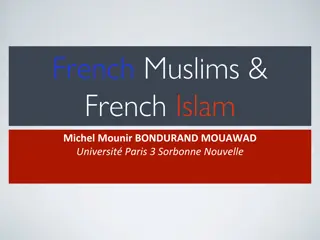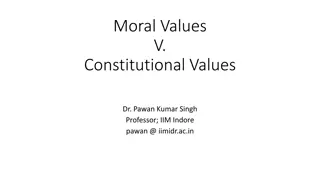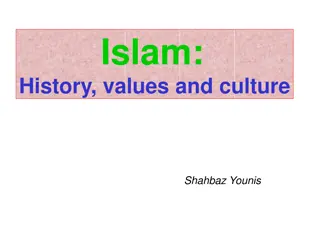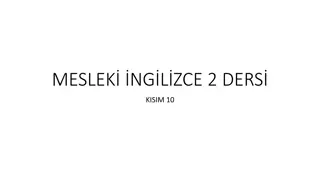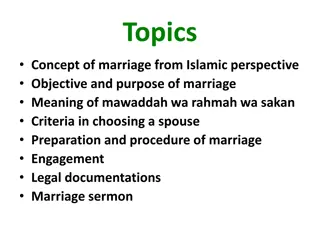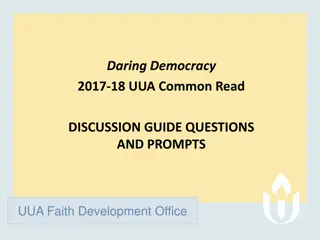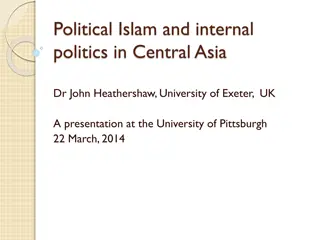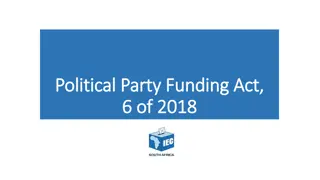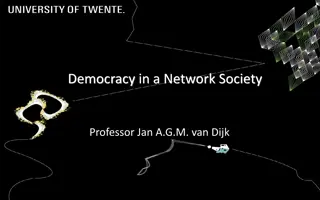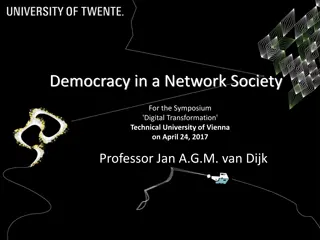Islam, Justice, and Democracy: A Study on Religious Values and Political Preferences
This study explores the relationship between Islamic justice values and political preferences, focusing on the impact of religion on democratic and authoritarian orientations. It addresses key research questions regarding the influence of religious values on pious Muslim men and women and their support for democracy. The study challenges existing notions and presents a new approach to understanding the complex interplay between Islam, justice, and democracy.
Uploaded on Sep 21, 2024 | 1 Views
Download Presentation

Please find below an Image/Link to download the presentation.
The content on the website is provided AS IS for your information and personal use only. It may not be sold, licensed, or shared on other websites without obtaining consent from the author.If you encounter any issues during the download, it is possible that the publisher has removed the file from their server.
You are allowed to download the files provided on this website for personal or commercial use, subject to the condition that they are used lawfully. All files are the property of their respective owners.
The content on the website is provided AS IS for your information and personal use only. It may not be sold, licensed, or shared on other websites without obtaining consent from the author.
E N D
Presentation Transcript
Islam, Justice, and Democracy Sabri Ciftci Professor of Political Science Kansas State University Manhattan, KS 66503 GRRI Project Launch Grant, Award #BG5225
How do religious values shape political preferences? Does religion play a role in bringing about democratic or authoritarian orientations? Research Questions What is the relationship between justice as a central value of religion and political preferences? This study answers these questions in the context of an enduring puzzle, namely Islam and democracy.
What kind of democracy do religious Muslims want and would accept? To what extent Islamic justice values inform support for democracy by pious Muslim men and women? Are Islamic justice values more conducive to authoritarian preferences? Islam and Democracy
Islam and Democracy :State of the Field EssentialistLack of democracy is due to religion leaving little room for independent thinking, change, and popular sovereignty Islamic origins of pluralistic ideas PuzzleThe lack of democracy in The scholarly output about democracy gap in the Muslim world is far from reaching a consensus. Counter-Essentialist principles of faith or Islamic culture Muslim-majority societies have sparked considerable interest among social scientists. Conceptions of legal methodology (ijtihad, ijma, shura) In Islam God determines everything and there is no room for man-made legislation Examples of pluralistic episode and mobilization in Islamic history Islam is an all-encompassing Kemal (1998), Iqbal (1968), Filali-Ansary (1999), El Fadl (2004). Gellner (1983), Kedourie (1992), Lewis (2005) , Huntington (1993)
Islam and Democracy: Empirical Approach Public Opinion Surveys and Religiosity Is Muslim Piety correlated with support for democracy? After a decade of research, ambivalence remains Religiosity is NOT negatively correlated with democracy At most, a non-relationship between religiosity and support for democracy is observed
A new approach Existing studies failed to satisfy the intellectual curiosity about Islam and democracy Empirical research remains inconclusive This study presents a novel approach in the study of Islam and democracy This novel approach builds on an emerging scholarship that seeks to authenticate pluralism and democracy within the Islamic ethical system. El Fadl (2004); An-Naim (2008)
Muslims, Justice, and Democracy Any religion s capacity to inform political preferences stem from values that are essential to a faith. It is imperative to understand how ordinary people understand religious values to explain their political preferences This study employs a novel perspective in studying Muslim political attitudes toward democracy by focusing on one of the principal values of the Islamic faith, namely justice (al- adl) This study focuses on Muslim agency and proposes that we study Muslims and democracy rather than Islam and democracy.
Justice Justice is the essential concept of Islam s ethico-political system Muslims acceptance of democracy will be conditional on its compatibility with Islamic justice values (El Fadl 2004) Justice has deeply influenced Muslims worldviews, social order, and political discourses in Islamic history (Darling 2013) Justice is a central value that informs democratic thinking, opposition, and popular mobilization in the Muslim world (Thompson, 2013, An-Naim 2008)
Theory and Hypotheses Historical legacies of Islamic justice conceptions inform political preferences These legacies develop along political and social trajectories and continue to shape Muslim political attitudes
Data and Method The project deploys mixed-methods and variety of data to provide an empirical assessment of the hypotheses. Methods Data Concepts Findings Close Reading of Primary Texts Qutb s and Shariati s political writings Islamist justice theory Political and social justice, political preferences Islamist justice theory justifies freedom and democracy Discourse Analysis Archives of Turkish Islamist journals Freedom and order as elements of Islamist justice Islamist ideology bring about both democratic and authoritarian attitudes Ethnographic Analysis In-depth interviews with Turkish Islamists Historical legacies of justice conceptions Historical legacies of justice conceptions inform Islamist political preferences, Cautious approach toward democracy Statistical Analysis World Values Surveys Individualism, distributive preferences, democracy Religion increase support for democracy through individualism and Islam s egalitarian focus Statistical Analysis Arab Barometer Justice discourses and protest Islam informed justice demands and protest participation in the Arab Spring
Justice conceptions are the leading cultural determinants of democracy in Islam. Because justice is the most significant notion in Islam s ethico- political system, this relationship is most visible in Muslim political experience. The legacies of Islamic justice engender rival legitimacy claims about governance through two distinct paths: Scriptural emphasis about man s vicegerent status leads to a path of freedom, individualism, and democracy (similar to liberation theology) Pre-deterministic interpretation of Islam leads to a path of obedience and authoritarianism Quranic notions of welfare and public interest shape both paths Contribution and Findings
The legacies of Islamic justice engender rival legitimacy claims about governance (Evidence from Turkish Islamism and Islamist archives)
Contribution and Findings (Evidence from two dozen in- depth interviews and ethnographic research) Muslim agency s support for democracy is contingent on the perception of democracy as a regime with a comparative advantage in implementing social and political justice by most religious citizens in a given polity. The desire of masses toward democracy has been countered by the centrifugal force of domestic dictators and their international collaborators, resulting in authoritarian, corrupt, and inefficient governments in Muslim-majority societies.
Contribution and Findings Religious individuals are more likely to support democracy thanks to holding egalitarian distributive preferences and value orientations conducive to individual autonomy. Perceived social and political justice violations are among the leading reasons for protest participation in the Arab Spring. Figure: Perceptions about social and political justice in the Arab World (evidence from the Arab Barometer)
Mediation Mechanisms (deliberation and accountability) Contribution and Findings Distributive Preferences Support for Democracy Religiosity Muslim religiosity increases support for democracy by generating pro-distributive preferences and certain types of individualistic value orientations. Individualistic Orientations Alternative Mediation Mechanisms (benevolent dictator) Distributive Preferences Support for Authoritarianism Religiosity Collectivist Orientations
Contribution and Findings Muslim religiosity increases support for democracy by generating pro-distributive preferences and certain types of individualistic value orientations. Figure: Egalitarianism and individualism in the Muslim world. Evidence from the World Values Surveys
Muslim religiosity increases support for democracy by generating pro-distributive preferences and certain types of individualistic value orientations. Evidence from the World Values Surveys Contribution and Findings Equation 1 Equation 2 Equation 3 Equation 4 Distributive Preferences Support for Democracy Self-direction Self-determination Religiosity 0.046*** -0.270*** 0.050*** 0.025** (0.007) (0.015) (0.007) (0.008) Social and Political Justice Indicators Distributive Preferences 0.033*** (0.007) Self-direction -0.001 (0.003) Self-determination 0.103*** (0.007) Multiple Mediation Analysis
Religion informs political preferences by shaping value orientations Justice is the central concept of Islam and it informs value orientations and political preferences Culture matters, and religion as the leading determinant of culture in Muslim-majority societies can be conducive to democracy Conclusion There is significant potential for legitimizing democracy through Islamic values that are familiar to religious Muslims Islamic justice values are essentially this component, arguably the missing link in converting supporters of democracy to practitioners of democracy
There is significant potential for democratization in the Muslim World yet this potential has not been realized Conclusion An important question that could be explored in future studies is why liberation discourse failed, whereas discourses of order and obedience prevailed.
Project Output Book: Islam, Justice, and Democracy, Temple University Press, December 2021. http://tupress.temple.edu/book/2000000001048 9 Article: Islam, Social Justice, and Democracy, Politics & Religion . Dec2019, Vol. 12 Issue 4, p549-576. https://doi.org/10.1017/S1755048318000810
References An-N im, Abdullahi Ahmed. Islam and the Secular State. Harvard University Press, 2008. Darling, Linda T. A history of social justice and political power in the Middle East: The circle of justice from Mesopotamia to globalization. Routledge, 2013. Fadl, Khaled Abou El. Islam and the Challenge of Democracy: A Boston Review Book. Princeton University Press, 2004. Filali-Ansary, Abdou. "Muslims and democracy." Journal of Democracy 10, no. 3 (1999): 18-32. Gellner, Ernest. Muslim Society. Cambridge University Press, 1983. Huntington, Samuel. The Clash of Civilizations. Foreign Affairs 72, no. 3 (1993): 22 49. Iqbal, Mohammad. The Reconstruction of Religious Thought in Islam. Lahore: Sh. Muhammad Ashraf, 1968. Kedourie, Elie. Democracy and Arab Political Culture. Washington, DC: Washington Institute for Near East Policy, 1992. Kemal, Nam k. And Seek Their Council in the Affairs. In Liberal Islam: A Source Book, edited by Charles Kurzman, 114 48. Oxford University Press, USA, 1998. Lewis, Bernard. Freedom and Justice in the Modern Middle East. Foreign Aff. 84 (2005): 36. Thompson, Elizabeth F. Justice Interrupted. Harvard University Press, 2013.
Contact Sabri Ciftci Professor and Michael W. Suleiman Chair Department of Political Science Kansas State University 802 Mid-campus Drive 216 Calvin Hall Manhattan, KS 66506 Phone: +1 785 532 6842 ciftci@ksu.edu or ciftci.sabri@gmail.com www.sabriciftci.com
